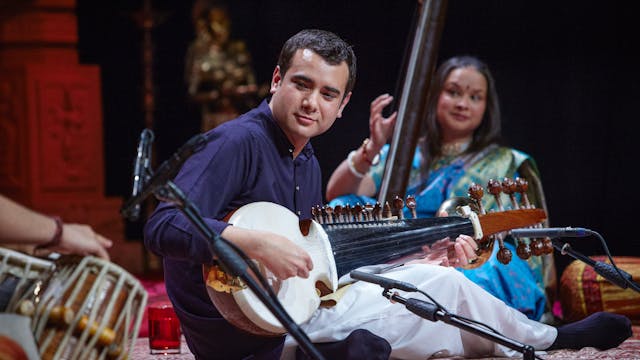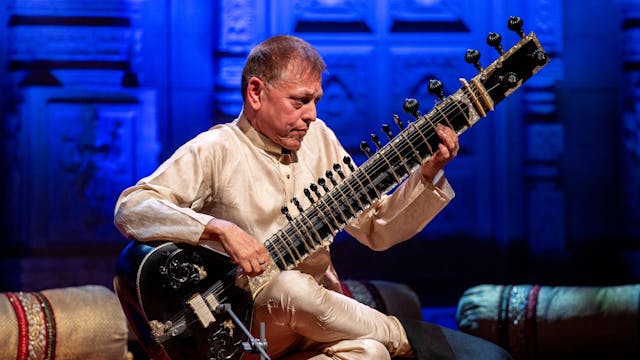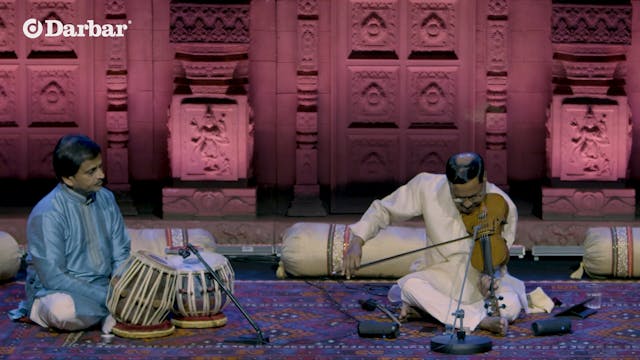Purbayan Chatterjee | Maru Bihag
Hindustani Instrumental
•
58m
Recorded at Darbar Festival 2011, on 23rd April at King's Place, London.
Musicians:
- Purbayan Chatterjee (sitar)
- Anubrata Chatterjee (tabla)
- Debipriya Das (tanpura)
Raag Maru Bihag; Thaat: Kalyan; Samay: Night
Purbayan Chatterjee plays the much loved, Raag Maru Bihag as the opening melody of his performance at the Darbar Festival 2011. He opens the recital with an alap, jor and jhala and then plays two compositions. He is accompanied by Anubrata Chatterjee on the tabla who gives commendable support, making this recital an exciting journey for the audiences.
Chatterjee begins with an expansive alap, detailing the raga’s central features with ‘Kalyan-like’ phrases. He deploys tender murkis (decorative notes) and lively gamaks, pausing at Pa, Ga and Ni (5th, 3rd and 7th) to highlight the ‘nyasa-swaras’ of the raga. Conjoining the ‘Bihag’ characteristics to the phrases, he gradually moves on to the jod. Using swift and fluid combination of notes, he brings out the bright and sweet essence of Maru Bihag.
Chatterjee exhibits virtuosic tantrakaari (instrumental nuances) in the jod, moving on to the slower composition set to a 7-beat cycle of rupak taal. He uses this part of the recital to solidly entrench the subtle interplay between the Kalyan and Bihag traits of the raga.
The faster tempo composition is a beautiful number – ‘Jagu main sari raina,’ set to teental. This bandish was highly popularized by music doyenne Prabha Atre during the 60’s when she was at the prime of her career. Chatterjee plays raging taans, mellowing it down at appropriate moments to calibrate his rendition with the sweet temperament of the raga.
Raag Maru Bihag belongs to the Kalyan thaat. Its central characteristics are built with Kalyan-ang while it draws the rest of its features from Raag Bihag. The Re (2nd) in Maru Bihag is always sung as a fleeting meend (glide) from Sa during the descending order. It’s jati is audav-sampoorna, which means it uses 5 notes in the ascent and 7 notes in the descent.
Maru Bihag omits Re and Dha (2nd and 6th) from its ascending movement. The descending movement uses all notes in highly convoluted structures. The use of teevra and shudh Ma (sharp and pure 4th) define the key features of the mellifluous paradigm of Maru Bihag. The dominant note is Ga (3rd) and the sub-dominant is Ni (7th). The origin of this raga is credited to Ustad Alladiya Khan, the creator of the Jaipur-Atrauli gharana.
Purbayan Chatterjee has learned to play the sitar from his father, Pandit Parthapratim from the age of 5. He trained in the Senia Maihar style, drawing from the rich tone and melodic depth of Pandit Nikhil Banerjee’s sitar. He was deeply influenced by Pandit Ajoy Chkraborty’s music during his teenage years. At the age of 15, Chatterjee began to learn from Ustad Ali Akbar Khan which refreshed his perceptions about music. Regular stage performances began at 17 after he received the national award from the
President of India as the best instrumentalist of the country in 1993. Thereafter, he has performed in major festivals and venues all over India and the five continents. Chatterjee is deeply influenced by the music of Ustad Vilayat Khan, Ustad Rais Khan, Ustad Zakir Hussain and Jazz legend Pat Metheny from whom, he draws inspiration from time to time.
Anubrata Chatterjee plays the Farukkhabad style; His talent has earned him accolades around the world because of the clarity of his bols, power, tonal richness and steadfast ‘laykaari’. He is the son and disciple of leading tabla player Pandit Anindo Chatterjee and has also trained under the legendary musician Jnan Prakash Ghosh (1909-1997). He peppers his Farukhabad-based playing with touches of Lucknow and Ajrada gharanas and has established himself as one of the most sought-after accompanists and an accomplished solo tabla artist at a young age.
Up Next in Hindustani Instrumental
-
Alam Khan | Mishra Piloo
Recorded at Darbar Festival 2011, on 22nd April, at King's Place, London
Musicians:
- Alam Khan (sarod)
- Anubrata Chatterjee (tabla)
- Debipriya Das (tanpura)Raag Mishra Piloo: Thaat: Kafi; Samay: Afternoon
He plays two beautiful compositions, the first one is a dhun in Mishra Piloo set ...
-
Pandit Budhaditya Mukherjee | Darbari...
Recorded at Darbar Festival 2019 on 13th October at the Barbican Centre, London.
Musicians:
- Pandit Budhaditya Mukherjee (sitar)
- Soumen Nandy (tabla)Raag: Darbari Kanada; Thaat: Asavari; Samay: Midnight
This concert from the Darbar Festival 2019 will remain etched in your memory forever...
-
Praveen Sheolikar | Raag Gorakh Kalyan
Praveen Sheolikar delivers his debut performance in the UK at the Queen Elizabeth Hall at Darbar Festival 2018, on 22nd September.
Musicians:
- Praveen Sheolikar (violin)
- Vinod Lele (tabla)Raag Gorakh Kalyan; Thaat: Khamaj; Samay: Night



